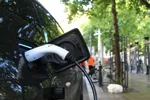During Toyota’s global recall over accelerator pedal issues some years ago, I expressed the view that it was not a total disaster. Having customers come back into the dealer network gave the opportunity to re-engage and, if done properly, presented an opportunity to begin building new relationships.
Over the years, car companies have made mistakes –some through a lack of oversight and poor management, some by unexpected technical problems. These incidents may lead to a loss of confidence in the manufacturer, but there was always the underlying belief that these mistakes were just that – they were not done intentionally.

Professor Jim Saker is
director of the Centre for
Automotive Management
at Loughborough
University’s Business
School and an
AM Awards judge.
He has been involved
in the automotive
industry for more
than 20 years.
Even when car manufacturers have been fined for overstating performance, this could be put down to over-zealous marketing and the misinterpretation of data.
The damage to the VW brand will be enormous
The case of Volkswagen and the emissions issue is fundamentally different.
Martin Winterkorn’s admission that the company deliberately fitted ‘defeat device’ software to falsify test results in both the US and Europe takes the issue of trust to a different level. The admission that this happened across Volkswagen Group raises major problems for Audi, Skoda and Seat. At the time of writing, other car companies are being looked at, but nothing as yet has been alleged.
The problem with this situation is that potentially everyone loses except for the lawyers. Volkswagen will quite justifiably lose out heavily through fines and compensation. One suspects that the damage to the brand will be enormous.
When Gerald Ratner announced at an Institute of Directors conference that one of his jewellery company's products, a decanter, was ‘total crap’, there was no coming back. The public felt betrayed and there was a reluctance to believe in the brand again.
The fact that VW has quite openly admitted to trying to dupe legislators as well as the general public is devastating. If this were a smaller company, it could be fatal. In the scheme of things, Volkswagen is too big to fail.
The problem is that the reputational damage occurs not only at the manufacturer level, but also across the industry as a whole. In the minds of the general public is the nagging question ‘if they have done it, who else is at it?’
“It is particularly disappointing that the retail automotive sector is once again being dragged down in public opinion. We may have buried Arthur Daley, but he has re-emerged with a German accent”
The public bought cars based on information provided by the manufacturer, but those cars were delivered face-to-face by dealer staff.
In apologising for the actions of the company, Winterkorn talked about a breaking of trust, particularly with consumers, but failed to highlight the breaking of trust with its dealer network.
In reality, it’s the dealers that potentially suffer more than the public. With such a high percentage of new cars being bought on PCPs, the consumer has an opt-out at the end of the scheme. The dealer does not have that option.
Many dealers have invested heavily in VW Group franchises to ensure they meet the exacting retail standards of the manufacturer. They will now be faced with potentially declining residual values on VW diesels, coupled with a major task in rebuilding confidence in their customer base.
Although dealers are currently arguing that consumers realise it is the manufacturer who is at fault and not them, I believe they are looking at the situation with rose-tinted spectacles. The dealer is seen as the representative of the manufacturer and has the tainted brand above their door.
From a consumer’s point of view, can they now trust anything said by the dealer? How do they know that the information is correct?
Other car companies will be scrutinising themselves
It is particularly disappointing that the retail automotive sector has made tremendous leaps in professionalising its approach and is once again being dragged down in public opinion. We may have buried Arthur Daley, but he has re-emerged with a German accent.
It is also ironic that one of the most successful adverts produced by Greenpeace was their send-up of VW’s Darth Vader advert, where they portrayed the world being under attack from the CO2 emissions of the car company. Although it was dismissed at the time, it now has a ring of truth far greater than I suspect even Greenpeace expected.
Whatever charges are brought against VW and its senior management, a bond of trust has been broken. The customer trusted the dealer and the dealer trusted and invested in the VW brand.
Other companies will be looking very closely at their operations and I am sure will be taking remedial action to ensure they comply with the both the legislation and the spirit of the law.
It has taken more than 70 years to build a global brand that was trusted and respected throughout the world. The breaking of trust and the damage to the brand it will cause could potentially last longer than Martin Winterkorn’s €28 million pension pot.














Login to comment
Comments
No comments have been made yet.